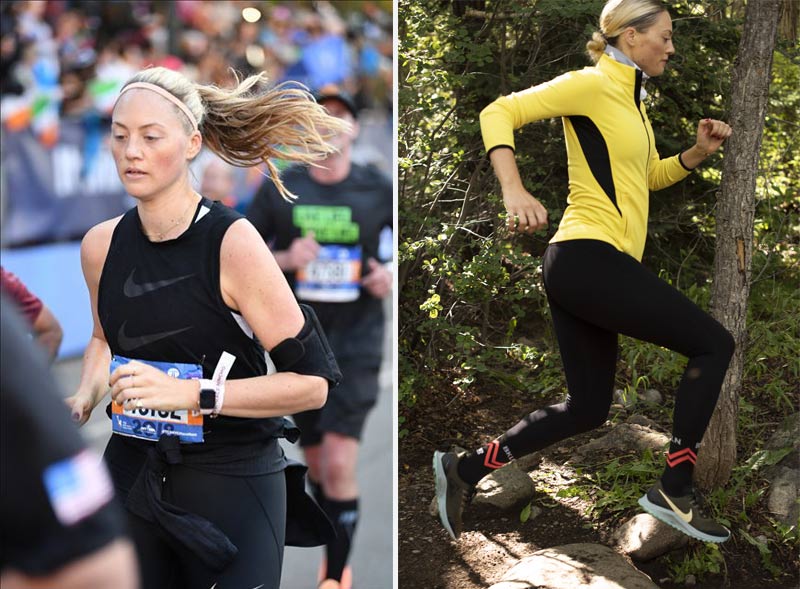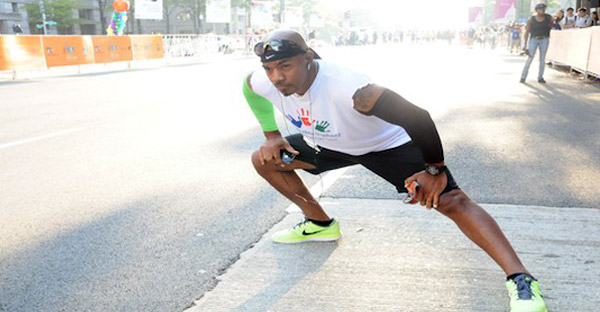

I am a plant-based endurance athlete, and the most common concerns people have involve my protein and caloric intake levels. “Is it enough?” most of them ask. The answer, quite simply, is that I am more nourished and stronger than ever, eating and living this way. Let me take you back twelve years. I was a young post-college grad with health issues. My skin wasn’t quite right, my energy levels were low, and I had dry patches on my scalp. At the suggestion of my dermatologist (of all people!), I went vegan. As a health-conscious person for most of my life, I altered my diet quite radically, cutting out all animal and processed foods to see if these health issues could be mended through diet. Sure enough, through the abundance of plants, fruits, nuts, and grains, my issues went away over time.
It is my firm belief that eating a whole food, plant-based diet has enabled my body to recover more efficiently and boost my energy levels immensely.
When my plant-based journey became more serious, like second nature, I took a deeper dive and followed Dr. Esselstyn’s guidelines quite closely. I read Dr. T. Colin Campbell’s The China Study and became more devout and committed to my healthy eating habits to aid in my marathoning. To date, I have run six marathons, one ultramarathon, and will run the 2019 TCS NYC Marathon on November 3rd, 2019.
Marathon Training With a Plant-Based Lifestyle
Marathon training takes a toll on the body, so just as important as running is to the training process, a healthy diet and commitment to recovery are key. On average, I run 50 miles a week, spending time in the gym working on core and overall total strength. In addition to the dedication training takes, I cook all my meals and snacks from scratch (plant-based, not a trace of oil in any given recipe). All in all, there is an immense amount of effort in this lifestyle. It is my firm belief that eating a whole food, plant-based diet has enabled my body to recover more efficiently and boost my energy levels immensely. One key critical competent I pay attention to is making sure I am ingesting enough “fuel” to make up for the calories burned on a long run. (These long runs are typically 15-20 miles before the taper.) But why do I feel my body is in optimal shape with a shorter recovery process eating this way? It is directly correlated to eating a variety of whole, nutrient-dense foods, daily. Consuming a variety of vegetables, along with healthy carbohydrates and some fats, fuels my body with what it needs. This way of life does not go unquestioned, however.

Busting the Myth That Athletes Need Protein
To dispel the myth that I do not receive enough protein and/or calories from those concerned, I often remind people of the importance of feeding your body foods it recognizes, and foods that don’t harm us. Knowledge is power and food is an emotional subject, so it’s best to be properly educated when speaking on the matter. As an avid runner and athlete, I find that consuming plants, fruits, nuts, and whole grains is enough nutritionally for me. I do not need any animal protein for marathon training, period. There is no scientific evidence that shows humans need animal protein—or an abundance of protein, in fact—to survive, or for athletes to sustain in sport. In 1905, Dr. Chittenden of Yale University published a study titled “Physiological Economy in Nutrition,” which addresses the nutritional needs for men (and women), with a particular emphasis on the minimal protein requirement for a healthy human. In the study, we learn that any protein intake beyond our daily requirements could cause harm to the body. Dr. Chittenden goes on to write:
Fats and carbohydrates when oxidized in the body are ultimately burned to simple gaseous products…easily and quickly eliminated…. With proteid [protein] foods…when oxidized, yield a row of crystalline nitrogenous products which ultimately pass out of the body through the kidneys. [These nitrogen-based protein byproducts]—frequently spoken of as toxins—float about through the body and may exercise more or less of a deleterious influence upon the system, or, being temporarily deposited, may exert some specific or local influence that calls for their speedy removal.
What I Eat in a Day As a Plant-Based Runner
A typical day in the life for me as a plant-based runner is a busy one. With multiple work projects and a heavy training schedule, I look forward to making my meals. When I sit down to eat, it is my time to relax and nourish my body. Most days I start with a banana smoothie complete with flaxseed, spinach, kale, and almond butter. My smoothies are all made with my homemade almond mylk. Lunch is a big kale salad with a variety of fresh herbs, chopped raw veggies, and homemade oil-free dressing. I like to sprinkle nutritional yeast on top or a cashew “parmesan” topper I make from cashews, pink salt, and nutritional yeast. If I need a snack, I reach for berries, sometimes adding a scoop of homemade almond butter. Dinner is usually another salad or a big cup of vegan homemade chili and baked sweet potato. Most of my produce is sourced from the local farmers’ market and is organic. Living in an oil-free household means a cupboard, and fridge, stocked with vinegars, mustard, tahini, and lemons. I can puree and bake just about anything oil-free. Perhaps this seems extreme to some, but the happiness I feel in feeding my body with optimal nutrition results in great rewards, mentally and physically.
Plant-Based Runner Sample Menu:
- Breakfast = Nutrient dense banana smoothie
- Lunch = Large kale salad with oil-free dressing and non-dairy cheesy topping
- Snack = Berries with almond butter
- Dinner = Vegan chili and baked sweet potato
So, as the training schedule tapers and the weather settles into the fall chill, I’ll start preparing healthy soups and stews complete with leafy greens, potatoes, and beans. When I wake up early on November 3rd, I can run easy knowing that I have prepared the best I can and I have nourished my body with whole, nutrient-dense foods void of any animal, synthetic sugars, or chemicals.
Copyright 2026 Center for Nutrition Studies. All rights reserved.
Deepen Your Knowledge With Our
Plant-Based Nutrition
Certificate
Plant-Based Nutrition Certificate
- 23,000+ students
- 100% online, learn at your own pace
- No prerequisites
- Continuing education credits






